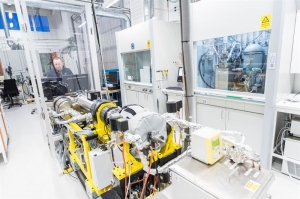


(Posted on 12/04/22)
A powerful consortium of shipping stakeholders is aiming to develop demonstrators for two-stroke and four-stroke marine engines running on ammonia fuel. The Ammonia 2-4 project aims to advance viable concepts for ammonia fuel.
The project is coordinated by technology group Wärtsilä, with participation from naval architects C-Job, classification society DNV, ship owner MSC and the National Research Council (CNR) of Italy. It has secured funding of €10 million from the European Union through the Horizon Europe research funding initiative.
“Ammonia is one of main candidates in shipping’s search for future fuels,” explains Sebastiaan Bleuanus, General Manager, Research Coordination & Funding, Wärtsilä Marine Power. “Wärtsilä has already proven an engine concept running on blends of up to 70% ammonia so far and will have a concept running on pure ammonia by 2023. This project is a fantastic opportunity to accelerate development of the solutions shipping will need.”
The outcomes of the project will include a lab-based demonstrator for the four-stroke ammonia engine, and a lab-based test engine followed by a vessel retrofit for the two-stroke version by 2025. As well as advancing the engine concepts, the Ammonia 2-4 project will further develop concepts around fuel handling and safety as well as contributing inputs towards a regulatory framework for ammonia.
Niels de Vries, Lead Naval Architect at C-Job Naval Architects, said: “Thanks to the project set-up, we’ll be able to show the application of ammonia as a marine fuel for both ships using fuel direct configurations and ships using fuel electric configurations. We’re excited to take this next step and apply our knowledge and experience in Ammonia 2-4 together with our partners.”
“Ammonia as fuel has great potential, especially for deep-sea shipping. Collaborative efforts to put safe, reliable and environmentally friendly engine technology in place are essential for ammonia to enter the fuel mix. We are therefore very pleased to team up with such esteemed partners in this project and look forward to supporting it with our expertise in assessing health, safety and environmental concerns, as well as helping to close regulatory gaps surrounding its use as a marine fuel,” said Hans Anton Tvete, Programme Director Maritime, Group Research and Development, DNV.
Dr Paolo Sementa and Dr Cinzia Tornatore, researchers at CNR’s Institute of Sciences and Technologies for Sustainable Energy and Mobility, said: “CNR will be involved in the activities of Ammonia 2-4 making use of the strong knowhow on internal combustion engines and on alternative fuels. Ammonia is a promising alternative fuel with potential to make a major contribution to the decarbonisation of shipping and to the reduction in greenhouse emissions. For this reason, this ambitious project will represent a milestone in reducing the environmental impact of marine transport sector.”
Leading vessel performance platform Smart Ship Hub says the industry should expect a breakthrough year... Read more
The Nordic countries are taking an important step towards decarbonising maritime transport with the... Read more
Germany’s Steelpaint has appointed ADD Marine as its representative for Greece and Cyprus, strengthening... Read more
Rio Tinto’s first Pilbara-made iron ore rail car has rolled off the production line in Karratha... Read more
Precision meets progress at Phu My Port, Vietnam. The LPS 550 has been deployed to handle bulk commodities... Read more
bound4blue, a global leader in wind propulsion systems, has expanded its industrial footprint in Asia... Read more
As the industry explores multiple decarbonisation pathways, methanol is gaining attention as a practical... Read more
Technology group Wärtsilä will supply an integrated hybrid propulsion system for a bulk carrier... Read more
Superior Industries, Inc., a US-based manufacturer and global supplier of bulk material processing and... Read more
ESL Shipping has taken a significant step forward in digitalisation by deploying a new multichannel... Read more